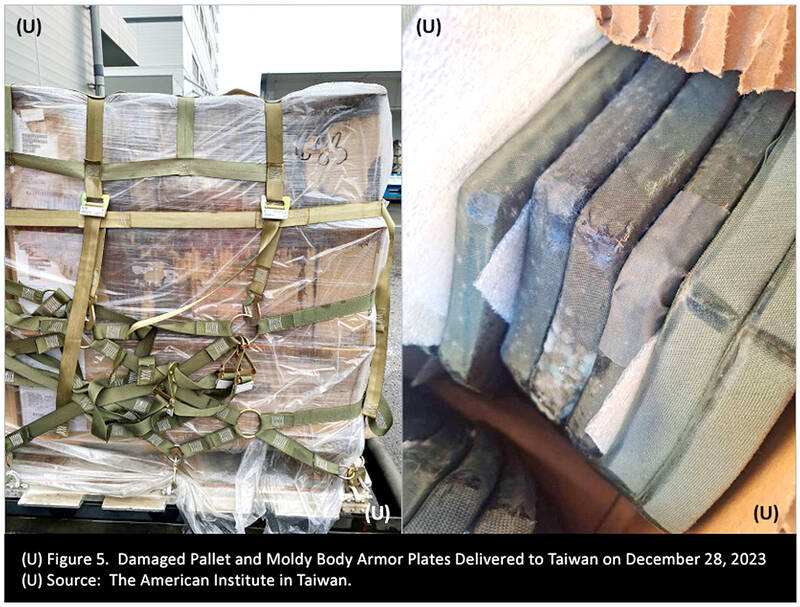The US Department of Defense (DOD) has taken action to make improvements after “unserviceable and poorly packaged” equipment and munitions were sent to Taiwan under the US Presidential Drawdown Authority (PDA), the department said on Friday.
The PDA is a process under which the US can send equipment and weapons from existing stocks to its allied partners in crisis situations.
In July last year, the administration of US President Joe Biden authorized as much as US$345 million in defense articles and services to be sent to Taiwan under the presidential drawdown.

Photo: Screen grab from US Department of Defense Office of Inspector General’s Web site
“Taiwan is a key security cooperation partner, and the US government is committed to ensuring that equipment delivered to this partner is sufficient for operational use,” department spokesman Pete Nguyen said.
The department would learn from this experience, which was the first of its kind, and “has taken action to improve its PDA process for Taiwan,” Nguyen said.
The response came after the department’s Office of Inspector General (OIG) revealed in its report last week that the department had provided shipments of unserviceable and poorly packaged equipment and munitions to Taiwan from November last year to March.
MOLDY BODY ARMOR
“We appreciate the perspective this report brings to a complex and unique issue for a critical security cooperation partner and anticipate the positive impact it will have on the department moving forward,” Nguyen said.
The department in December last year delivered to Taiwan 120 water damaged pallets, which contained wet and moldy body armor, according to personnel from the American Institute in Taiwan (AIT), the de facto US embassy, the OIG report said.
The pallets remained at Travis Air Force Base for more than three months because the US Army did not begin initiating requests for Special Airlift Assignment Mission flights to Taiwan until December, the OIG said.
Taiwanese authorities had to spend weeks “unpacking, drying and inventorying the wet and moldy equipment,” it said.
REVIEW
In the same month, the Ministry of National Defense issued a letter to the AIT stating that Taiwan received 2.7 million rounds of ammunition from the department, including some that were expired, in a mix of original, loose and incorrect packaging, it said.
“The DOD did not effectively or efficiently implement accountability and quality controls for items delivered to Taiwan,” it said in the report, adding that those actions “inhibit the DOD’s ability to achieve established security cooperation goals and may lead to loss of partner confidence in the United States.”
The ministry on Friday said the shipments of equipment and munitions have been jointly reviewed and handled accordingly by Taiwan and the US, without elaborating.

CHAOS: Iranians took to the streets playing celebratory music after reports of Khamenei’s death on Saturday, while mourners also gathered in Tehran yesterday Iranian Supreme Leader Ayatollah Ali Khamenei was killed in a major attack on Iran launched by Israel and the US, throwing the future of the Islamic republic into doubt and raising the risk of regional instability. Iranian state television and the state-run IRNA news agency announced the 86-year-old’s death early yesterday. US President Donald Trump said it gave Iranians their “greatest chance” to “take back” their country. The announcements came after a joint US and Israeli aerial bombardment that targeted Iranian military and governmental sites. Trump said the “heavy and pinpoint bombing” would continue through the week or as long

TRUST: The KMT said it respected the US’ timing and considerations, and hoped it would continue to honor its commitments to helping Taiwan bolster its defenses and deterrence US President Donald Trump is delaying a multibillion-dollar arms sale to Taiwan to ensure his visit to Beijing is successful, a New York Times report said. The weapons sales package has stalled in the US Department of State, the report said, citing US officials it did not identify. The White House has told agencies not to push forward ahead of Trump’s meeting with Chinese President Xi Jinping (習近平), it said. The two last month held a phone call to discuss trade and geopolitical flashpoints ahead of the summit. Xi raised the Taiwan issue and urged the US to handle arms sales to

State-run CPC Corp, Taiwan (CPC, 台灣中油) yesterday said that it had confirmed on Saturday night with its liquefied natural gas (LNG) and crude oil suppliers that shipments are proceeding as scheduled and that domestic supplies remain unaffected. The CPC yesterday announced the gasoline and diesel prices will rise by NT$0.2 and NT$0.4 per liter, respectively, starting Monday, citing Middle East tensions and blizzards in the eastern United States. CPC also iterated it has been reducing the proportion of crude oil imports from the Middle East and diversifying its supply sources in the past few years in response to geopolitical risks, expanding

Pro-democracy media tycoon Jimmy Lai’s (黎智英) fraud conviction and prison sentence were yesterday overturned by a Hong Kong court, in a surprise legal decision that comes soon after Lai was jailed for 20 years on a separate national security charge. Judges Jeremy Poon (潘兆初), Anthea Pang (彭寶琴) and Derek Pang (彭偉昌) said in the judgement that they allowed the appeal from Lai, and another defendant in the case, to proceed, as a lower court judge had “erred.” “The Court of Appeal gave them leave to appeal against their conviction, allowed their appeals, quashed the convictions and set aside the sentences,” the judges